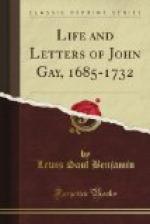It is now happily possible to elaborate the information given in this letter. Owing to the kindly offices of one or other of his friends, Gay had secured the appointment of domestic secretary to the Duchess of Monmouth. Anne Scott, Duchess of Buccleuch in her own right, had in 1663 married the Duke of Monmouth. He was executed for high treason in 1683, and three years later his widow married Charles, third Baron Cornwallis. Though she had not long mourned her first husband, she did not forget that he was on his father’s side of the blood royal, and to the end of her days she preserved a regal state, which, however, did not make her unpopular at Court. “The Princess,” wrote Lady Cowper, “loved her mightily, and certainly no woman of her years ever deserved it so well. She had all the life and fire of youth, and it was marvellous to see that the many afflictions she had suffered had not touched her wit and good nature, but at upwards of three-score she had both in their full perfection.” Upon this appointment Dr. Johnson commented: “By quitting a shop for such service Gay might gain leisure, but he certainly advanced little on the boast of independence.” As has been seen, however, there was an interval of several years between Gay’s apprenticeship and his taking up this position as the Duchess’s amanuensis—for it is doubtful if he ever attained to an office more responsible than this—he secured board and lodging, a little pocket money, and no doubt ample leisure. It was necessary for Gay to earn his livelihood, for he had spent his patrimony, and the earnings of his pen were as yet negligible. Indeed, the situation was almost ideal for an impecunious young man of letters. Anyhow, Gay was delighted, and Pope not less so. “It has been my good fortune within this month past to hear more things that have pleased me than, I think, in all my time besides,” Pope wrote to Gay, December 24th, 1712; “but nothing, upon my word, has been so homefelt a satisfaction as the news you tell me of yourself; and you are not in the least mistaken when you congratulate me upon your own good success, for I have more people out of whom to be happy, than any ill-natured man can boast of.” Pope, now well aware of Gay’s natural indolence, was careful in this same letter to urge him to devote himself to literary labours in his leisure hours. “I shall see you this winter with much greater pleasure than I could the last, and I hope as much of your time as your Duchess will allow you to spare to any friend will not be thought lost upon one who is as much so as any man,” he added. “I must also put you in mind, though you are now secretary to this lady, you are likewise secretary to nine other ladies, and are to write sometimes for them too. He who is forced to live wholly upon those ladies’ favours is indeed in as precarious a condition as any who does what Chaucer says for subsistence; but they are very agreeable companions, like other ladies, when a man only passes a night or so with them at his leisure, and away."[2]




